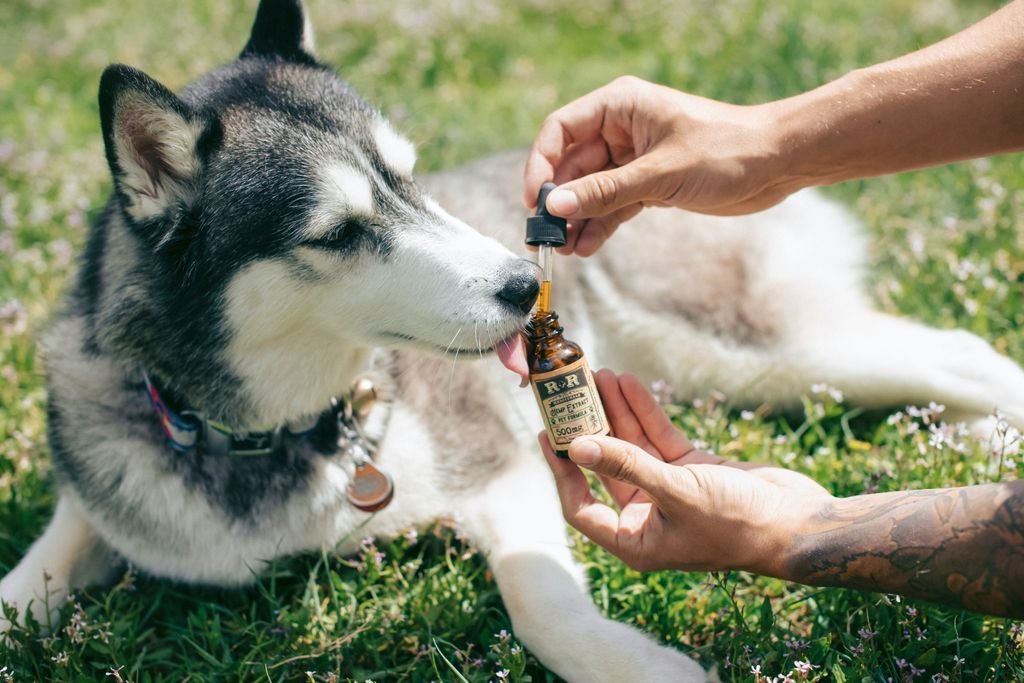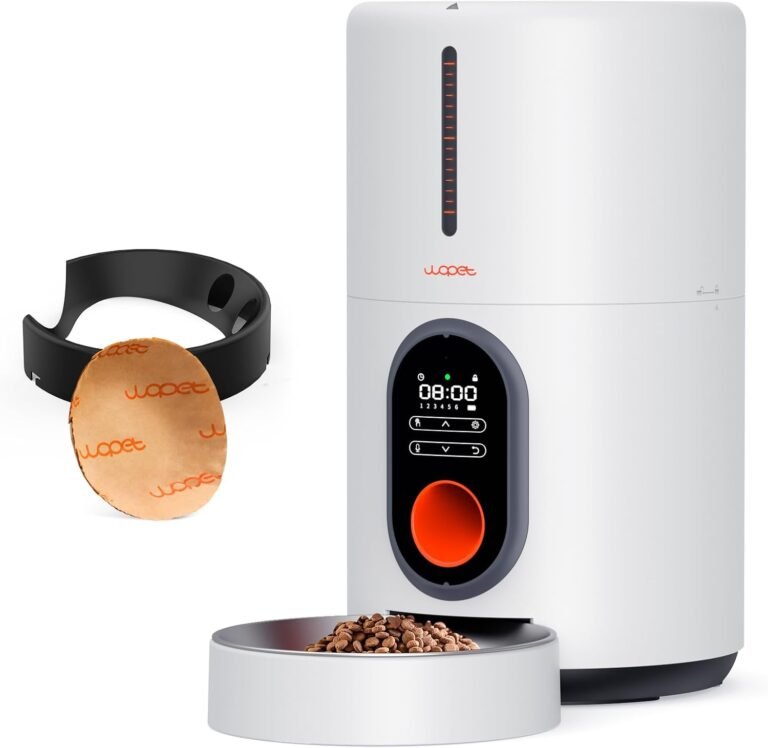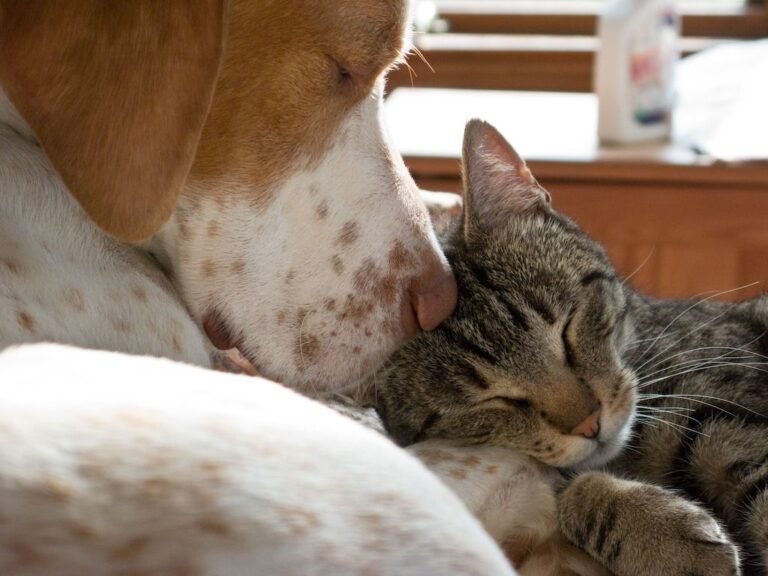Preventing Common Physical Health Issues in Pets
Ensuring the physical health of our pets is crucial for their overall well-being and happiness. By taking preventive measures, we can reduce the risk of common health issues and provide our pets with a long and healthy life. In this article, we will explore various aspects of pet health, including the importance of preventive care, maintaining a balanced diet, regular exercise, dental care, creating a clean and safe environment, recognizing and managing skin conditions, preventing parasitic infestations, and the significance of regular veterinary check-ups and vaccinations.
Key Takeaways
- Regular veterinary check-ups and vaccinations are essential for maintaining pet health and detecting early signs of illness.
- A balanced diet with the right pet food and proper nutrition is crucial for optimal pet health.
- Regular exercise and physical activity are beneficial for pets and help prevent obesity and related health issues.
- Dental hygiene is important for pets, and regular brushing and professional dental care can prevent dental problems.
- Maintaining a clean and safe environment for pets helps prevent accidents, injuries, and the spread of diseases.
Understanding the Importance of Pet Health

The Link Between Physical Health and Overall Well-being
Regular physical exams are an essential part of maintaining your pet’s health and well-being. These exams allow our veterinarians to detect early signs of illness, ensuring prompt and potentially life-saving treatment. Vaccinations are also crucial in protecting your pet from contagious diseases. By staying up to date with vaccinations, you can safeguard the health of your beloved pet. Additionally, behavioral counseling can help address problematic behaviors and promote a harmonious relationship between you and your pet. Nutrition and weight management play a vital role in preventing obesity and related health issues. By providing your pet with a balanced diet and regular exercise, you can ensure their overall well-being.
Common Physical Health Issues in Pets
Regular veterinary check-ups and preventive care are essential in maintaining the overall health and well-being of your pet. Physical exams and vaccinations are crucial in detecting early signs of illness and providing protection against contagious diseases. Behavioral counseling can help address problematic behaviors and ensure a harmonious relationship between pets and their owners. Nutrition and weight management play a vital role in preventing obesity and related health issues. By staying up to date with regular exams and vaccinations, you can give your beloved pet the best chance at a long, happy, and healthy life.
The Role of Preventive Care in Pet Health
Preventive care is the key to keeping our furry friends healthy and happy. As a pet owner, the secret to pet happiness and health is to ensure they receive the best veterinary services available.
Our preventative care services include:
- Behavioral counseling: It’s crucial to address problematic behaviors that may arise, helping both pets and their owners live harmoniously.
- Nutrition and weight management: This plays a vital role in preventing obesity and related health issues.
- Physical exams: Regular exams help our veterinarians detect early signs of illness, allowing for prompt and potentially life-saving treatment.
- Vaccinations: We provide protection against contagious diseases. By staying up to date with vaccinations, we can safeguard the health of our beloved pets.
Preventative care provides our pets with the best chance at a long, happy, and healthy life. At Middle County Animal Hospital, we take pride in helping your beloved pets maintain their best health and well-being.
Maintaining a Balanced Diet for Optimal Pet Health

Choosing the Right Pet Food
When it comes to choosing the right pet food, there are a few factors to consider. First and foremost, you want to ensure that the food you select meets your pet’s nutritional requirements. Look for a brand that is specifically formulated for your pet’s age, size, and breed. Additionally, it’s important to avoid harmful foods and ingredients that can negatively impact your pet’s health. Some common ingredients to watch out for include artificial preservatives, fillers, and by-products. By providing your pet with a balanced and nutritious diet, you can help promote their overall health and well-being.
Understanding Nutritional Requirements
Proper nutrition is essential for your pet’s overall health and well-being. Providing a balanced diet that meets their specific nutritional requirements is key to ensuring they thrive. HHOLOVE Automatic Cat Feeder with Camera is a great option for pet owners who want to monitor their pet’s feeding habits and ensure they are getting the right amount of food. This automatic feeder allows you to schedule and control your pet’s meals, making it convenient and easy to maintain a consistent feeding routine. Additionally, it has a built-in camera that allows you to check on your pet while you’re away. With the HHOLOVE Automatic Cat Feeder with Camera, you can have peace of mind knowing that your pet is receiving the proper nutrition they need.
Avoiding Harmful Foods and Ingredients
When it comes to your pet’s diet, it’s important to be mindful of the foods and ingredients that can be harmful to their health. Onions, garlic, chocolate, grapes, and certain spices are everyday Thanksgiving staples that should be avoided, as they can be toxic to dogs. Additionally, fatty and rich foods like turkey skin and gravy can lead to digestive issues. It’s best to stick to a balanced and nutritious diet specifically formulated for pets. If you’re unsure about what foods are safe for your pet, consult your veterinarian for guidance. Remember, a healthy diet is key to your pet’s overall well-being.
Regular Exercise and Physical Activity for Pets

The Benefits of Exercise for Pet Health
Regular exercise is essential for maintaining the overall health and well-being of your pet. It not only helps them stay physically fit but also provides mental stimulation and reduces the risk of obesity and related health issues. Exercise helps to keep their muscles strong, joints flexible, and improves their cardiovascular health. Additionally, it can help prevent behavioral problems by reducing anxiety and destructive behaviors.
To ensure your pet gets enough exercise, consider the following:
- Daily walks: Take your pet for regular walks to provide them with physical activity and mental stimulation.
- Playtime: Engage in interactive play sessions with toys or games that encourage movement and exercise.
- Swimming: If your pet enjoys water, swimming is a great low-impact exercise that is gentle on their joints.
Remember, each pet has different exercise needs based on their breed, age, and health condition. Consult with your veterinarian to create a personalized exercise routine for your furry friend.
Creating a Exercise Routine for Your Pet
To create an exercise routine for your pet, it’s important to consider their specific needs and abilities. Health benefits of CBD for pets can be a great addition to their routine, as it may help with pain management, anxiety, and overall well-being. Start by consulting with your veterinarian to determine the appropriate amount and type of exercise for your pet. This can vary depending on factors such as age, breed, and any existing health conditions. Once you have a plan in place, make sure to incorporate regular exercise sessions into your daily routine. This can include activities such as walks, playtime, and interactive toys. Remember to monitor your pet’s behavior and adjust the routine as needed. By providing regular exercise, you can help keep your pet physically and mentally stimulated, promoting a healthy and happy lifestyle.
Fun and Engaging Activities for Pets
Keeping your pet mentally stimulated is just as important as keeping them physically active. Engaging in brain games and enrichment activities can help challenge their cognitive abilities and problem-solving skills. Here are some ideas to try with your furry friend:
- Puzzle toys: These toys require your pet to figure out how to access treats or toys hidden inside. They provide mental stimulation and keep your pet entertained.
- Hide and seek: Hide treats or toys around the house and encourage your pet to find them. This game engages their sense of smell and keeps them active.
- Training sessions: Teaching your pet new tricks or commands not only provides mental stimulation but also strengthens the bond between you and your pet.
Remember, mental stimulation is essential for your pet’s overall well-being. Try incorporating these activities into your daily routine to keep your pet happy and engaged.
Preventing Dental Issues in Pets

Importance of Dental Hygiene for Pets
Dental health is a crucial aspect of your pet’s overall wellness care. Just like humans, pets can develop dental issues that can impact their overall health. Regularly brushing your pet’s teeth is an important preventive measure that can help reduce the risk of periodontal disease and costly dental procedures. Additionally, providing your pet with appropriate chew toys can help promote dental health by reducing plaque buildup and keeping their teeth clean. It’s important to note that some human dental products, such as toothpaste, can be harmful to pets, so it’s best to use pet-specific dental products. If you’re unsure about how to properly care for your pet’s teeth, consult with your veterinarian for guidance and recommendations.
Brushing Your Pet’s Teeth
Regularly brushing your pet’s teeth is an essential part of their dental care routine. It not only helps to keep their teeth clean and their breath fresh, but it also plays a crucial role in maintaining their overall health. Dental disease can lead to various health issues, including periodontal disease and expensive dental procedures. By brushing your pet’s teeth regularly, you can reduce the risk of these conditions and save on costly treatments in the long run.
To ensure effective teeth brushing, follow these steps:
- Choose a pet-friendly toothbrush and toothpaste specifically designed for pets. Avoid using human toothpaste as it can be harmful to them.
- Introduce tooth brushing gradually to help your pet get used to the process. Start by gently touching their teeth and gums with your finger, then gradually transition to using a toothbrush.
- Brush in a gentle circular motion to clean all surfaces of your pet’s teeth. Pay extra attention to the gum line where plaque and tartar tend to accumulate.
- Be patient and consistent. It may take some time for your pet to become comfortable with tooth brushing, so be patient and reward them with praise or treats for their cooperation.
Remember, regular teeth brushing is an important part of your pet’s overall health care. Consult with your veterinarian for specific recommendations and guidance on how often to brush your pet’s teeth and any additional dental care they may need.
Professional Dental Care for Pets
When it comes to maintaining your pet’s dental health, professional dental care plays a crucial role. While regular brushing at home is important, professional dental cleanings performed by a veterinarian are necessary to ensure a thorough cleaning and examination of your pet’s teeth and gums. During a dental cleaning, your veterinarian will remove plaque and tartar buildup, which can lead to gum disease and other dental issues. They will also check for any signs of tooth decay, infections, or oral tumors. Professional dental care is especially important for pets who may have difficulty with at-home brushing or have a history of dental problems.
To provide convenient feeding options for your pet after a dental cleaning, your veterinarian may recommend soft or wet food. These types of food are easier for pets to eat while their mouths are healing. Your veterinarian can provide guidance on the appropriate feeding schedule and portion sizes for your pet’s specific needs.
If you have any concerns about your pet’s dental health or need advice on maintaining their oral hygiene, don’t hesitate to reach out to your veterinarian for guidance and recommendations.
Maintaining a Clean and Safe Environment for Your Pet

Regular Cleaning and Sanitization
Regular cleaning and sanitization are essential for maintaining a clean and safe environment for your pet. By regularly cleaning your pet’s living space, you can prevent the buildup of harmful bacteria and parasites that can pose a threat to their health. It is important to use pet-friendly cleaning products that are non-toxic and safe for your furry friend.
In addition to cleaning their living area, it is also important to regularly clean your pet’s belongings, such as their bedding and toys. This helps to prevent the spread of germs and reduce the risk of infections.
Here are some tips for effective cleaning and sanitization:
- Use hot water and pet-safe detergent when washing your pet’s bedding.
- Disinfect your pet’s toys regularly using a pet-safe disinfectant.
- Vacuum and mop the floors in your pet’s living area to remove any pet hair and dander.
- Wash your hands thoroughly after handling your pet or cleaning their living space.
By following these cleaning and sanitization practices, you can help ensure that your pet’s environment remains clean, safe, and free from potential health hazards.
Pet-Proofing Your Home
When pet-proofing your home, it’s important to be mindful of the materials and items you use. Certain decorations, such as candles, potpourri, and fake fruits, can be hazardous to pets if ingested. Keep an eye on open flames, and consider opting for pet-safe decorations to avoid any accidents. Additionally, create a quiet and comfortable space where your pet can retreat if they need a break from the festivities. Provide familiar items like their bed, toys, and water to make them feel secure. Remember, the safety and well-being of your pet should always be a top priority.
Preventing Accidents and Injuries
Regular veterinary check-ups and vaccinations are essential for preventing accidents and injuries in your pet. These routine visits allow our veterinarians to assess your pet’s overall health and detect any underlying issues that may increase the risk of accidents or injuries. During these check-ups, our veterinarians will perform a thorough physical examination, checking for any signs of illness or injury. They may also recommend specific vaccinations to protect your pet against contagious diseases.
In addition to regular check-ups and vaccinations, there are several other measures you can take to ensure the safety of your pet:
- Pet-proofing your home: Remove any potential hazards or toxic substances that could harm your pet.
- Supervising outdoor activities: Keep a close eye on your pet when they are outside to prevent accidents or encounters with dangerous wildlife.
- Using appropriate restraints: When traveling with your pet in a vehicle, use a secure crate or harness to prevent injuries in case of sudden stops or accidents.
Remember, prevention is key when it comes to keeping your pet safe and healthy. By following these preventive measures and staying proactive in your pet’s care, you can minimize the risk of accidents and injuries.
Recognizing and Managing Common Skin Conditions

Identifying Skin Issues in Pets
When it comes to identifying skin issues in pets, there are several key areas to focus on. Start by examining your pet’s coat to assess its overall condition. Look for any signs of abnormal hair loss or dandruff, which could indicate an underlying skin problem. Inspect your pet’s skin for bumps or lumps, especially in folds of skin, as well as dryness and signs of parasites. Additionally, pay attention to your pet’s ears for signs of wax buildup, ear mites, or bacterial infection. Lastly, check the condition of your pet’s teeth for any indications of decay, damage, or periodontal disease. By regularly monitoring these areas, you can catch potential skin issues early and ensure a healthy skin and coat for your furry friend.
Proper Grooming and Bathing Techniques
Regular grooming, such as brushing, bathing, and nail trimming, is necessary to keep your pet clean and comfortable. It also allows you to inspect their skin and coat for any abnormalities. Spaying or neutering your pet not only helps control the pet population but also reduces the risk of certain health issues, such as reproductive cancers and aggressive behavior. If you notice signs of allergies in your pet, consult your veterinarian to identify the allergens and develop a management plan. Additionally, do-it-yourself grooming can be a cost-effective way to maintain your pet’s hygiene. With the right tools and guidance, you can handle basic grooming tasks at home and strengthen the bond between you and your furry companion. Remember, the most important aspect of pet care is the love and attention you provide – and that’s free!
Treating and Preventing Skin Conditions
Skin conditions can be uncomfortable and bothersome for your pet. It’s important to identify and address these issues to ensure your pet’s comfort and overall well-being. Here are some tips to help treat and prevent skin conditions:
-
Regular grooming and bathing: Keeping your pet’s skin clean and free from dirt and debris can help prevent skin issues. Use pet-friendly shampoos and conditioners that are suitable for your pet’s skin type.
-
Proper nutrition: A balanced diet with the right nutrients can promote healthy skin and reduce the risk of skin problems. Consult with your veterinarian to determine the best diet for your pet.
-
Avoiding allergens: Some pets may be allergic to certain substances, such as pollen or certain foods. Identifying and avoiding these allergens can help prevent skin reactions.
-
Treating infections promptly: If your pet develops a skin infection, it’s important to seek veterinary care promptly. Your veterinarian can prescribe appropriate medications to treat the infection and prevent it from spreading.
-
Regular veterinary check-ups: Regular check-ups with your veterinarian can help detect and address any underlying health issues that may contribute to skin problems. Your veterinarian can provide guidance on preventive measures and recommend appropriate treatments if needed.
By following these tips and providing proper care, you can help keep your pet’s skin healthy and prevent common skin conditions.
Preventing Parasitic Infestations in Pets

Understanding Common Parasites
When it comes to your pet’s health, it’s important to be aware of common parasites that can affect them. Fleas and ticks are two of the most common parasites that pets can encounter. These tiny creatures can cause a range of health problems, including skin irritation, allergic reactions, and even the transmission of diseases. To protect your pet from fleas and ticks, it’s important to implement preventive measures such as using topical solutions or collars. Additionally, regular grooming and checking your pet’s fur for any signs of infestation can help catch and address the issue early.
Another common parasite that pet owners should be aware of is heartworm. Heartworm disease can be fatal for dogs if left untreated. Monthly preventive medications are available to protect your pet from these parasites. Consult your vet for a suitable preventative plan.
In addition to fleas, ticks, and heartworm, there are other parasites that can affect your pet’s health. Intestinal parasites such as roundworms, hookworms, and tapeworms can cause digestive issues and other health problems. Regular deworming and protection against intestinal parasites are essential for your pet’s well-being. Many puppies are born with intestinal parasites, and adult dogs can become infected through contact with contaminated soil or feces. Your vet can recommend the appropriate deworming schedule for your pet.
Preventing and managing parasites is an important part of keeping your pet healthy. By implementing preventive measures and staying vigilant for any signs of infestation, you can help ensure that your pet stays parasite-free and enjoys optimal health.
Preventive Measures Against Fleas and Ticks
To protect your pet from fleas and ticks, it is important to take preventive measures. Invest in preventive treatments, such as topical solutions or collars, to keep these pests at bay. These treatments are designed to repel and kill fleas and ticks, preventing them from infesting your pet. Additionally, regularly check your pet for fleas and ticks and remove them promptly if found.
Heartworm prevention is also crucial for your pet’s health. Heartworm disease can be fatal for dogs, but monthly preventive medications are available to protect your pet from these parasites. Consult your vet for a suitable preventive medication and follow the recommended dosage.
Maintaining a clean environment is another important aspect of preventing fleas and ticks. Regularly vacuum your home, wash your pet’s bedding, and keep outdoor areas clean to reduce the risk of infestation.
Remember, prevention is key when it comes to fleas and ticks. By taking these measures, you can ensure the health and well-being of your beloved pet.
Dealing with Worm Infestations
Regular deworming and protection against intestinal parasites are essential for your dog’s well-being. Many puppies are born with intestinal parasites, and adult dogs can be exposed to them throughout their lives. Exercise and Mental Stimulation
Exercise is vital for your dog’s physical and mental health. It helps maintain a healthy weight, strengthens muscles, and stimulates your dog’s mind. Engage in activities like daily walks, fetch, and puzzle toys to keep your dog active and mentally stimulated. Health Issues Related to Obesity
Obesity in dogs can lead to various health issues, including diabetes, arthritis, and heart disease. Provide your dog with a balanced diet, control portion sizes, and engage in regular exercise to maintain a healthy weight. Parasite Prevention
Invest in preventive treatments, such as topical solutions or collars, to keep parasites at bay. Regular preventive medications are available to protect your pet from parasites like heartworms. Consult your vet for a suitable preventative plan.
Regular Veterinary Check-ups and Vaccinations

The Importance of Regular Check-ups
Regular veterinary check-ups are crucial for maintaining the health and well-being of your pet. Just like humans, pets can develop internal health issues and other serious conditions that may require attention. By scheduling routine physical exams with your veterinarian once or twice a year, you allow them to assess your pet’s general health and catch any potential health issues before they spiral out of control. During the exam, the veterinarian will conduct a thorough physical examination, checking your pet’s body, teeth, ears, and many other things. These wellness exams act as a proactive measure to detect any underlying health concerns that may not be apparent to us. Early detection of diseases or conditions gives us a head start in treating them before they become more serious. Regular check-ups can help prevent illnesses, detect early signs of disease, and keep your pet healthy for a long time.
Vaccination Schedule for Pets
It is important to establish a vaccination schedule for your pet in consultation with your vet. The schedule should be based on your pet’s age, breed, and lifestyle. Vaccinations help protect your pet from various diseases and infections. Regular vaccinations are administered during checkups, ensuring that your pet stays healthy and protected. Parasite prevention is also an essential aspect of pet health. Fleas, ticks, and worms can cause serious health issues for your pet. Invest in preventive treatments recommended by your vet to keep these parasites at bay.
Early Detection and Treatment of Health Issues
Regular veterinary check-ups are essential for the early detection and treatment of health issues in your pet. These exams allow veterinarians to detect any underlying health concerns that may not be apparent to us. Early detection of diseases or conditions gives us a head start in treating them effectively, increasing the chances of a positive outcome. Wellness exams also provide an opportunity for discussions about further preventive measures, such as vaccinations, parasite control, and nutrition. Your veterinarian can guide you on the best practices to keep your furry friend in optimal condition.
Don’t wait for a problem to arise before scheduling a wellness exam for your pet. Prevention is always better than cure, and regular check-ups are key to maintaining your pet’s health and well-being. Schedule a wellness exam today!
Regular veterinary check-ups and vaccinations are essential for maintaining the health and well-being of your beloved pets. At Whisker Wellbeing, we understand the importance of holistic and natural care for cats and dogs. Our mission is to provide products that enhance the physical and emotional quality of life for your furry friends. From CBD to hemp and other natural options, we offer a variety of solutions to support their overall well-being. Take the first step towards ensuring the long and happy life of your pets by scheduling a veterinary check-up and exploring our range of products. Visit Whisker Wellbeing today!
Conclusion
Preventive care is essential for maintaining the health and well-being of our beloved pets. Regular check-ups, vaccinations, and proper nutrition are key components of preventive care. By staying proactive and addressing any potential health issues early on, we can ensure that our pets live long, happy, and healthy lives. Remember to provide vet-recommended amounts of food, plenty of exercise, and schedule regular dental care. Preventive care is not only beneficial for our pets’ health, but it can also save us money on expensive treatments in the long run. Let’s prioritize the well-being of our furry friends and give them the best chance at a vibrant and fulfilling life.
Frequently Asked Questions
Why are regular veterinary check-ups important?
Regular veterinary check-ups are important because they help detect early signs of illness and allow for prompt treatment. They also include vaccinations to protect against contagious diseases.
What role does nutrition play in pet health?
Nutrition plays a vital role in preventing obesity and related health issues in pets. Choosing the right pet food and understanding their nutritional requirements is essential.
How can I create an exercise routine for my pet?
Creating an exercise routine for your pet involves regular physical activity and engaging activities that suit their breed and energy level. Consult with your veterinarian for guidance.
Why is dental hygiene important for pets?
Dental hygiene is important for pets because it helps prevent dental issues such as periodontal disease. Regular brushing and professional dental care are recommended.
How can I maintain a clean and safe environment for my pet?
Maintaining a clean and safe environment for your pet involves regular cleaning and sanitization, pet-proofing your home, and taking measures to prevent accidents and injuries.
What are common parasites in pets and how can I prevent infestations?
Common parasites in pets include fleas, ticks, and worms. Preventive measures such as using flea and tick preventives and regular deworming can help prevent infestations.







